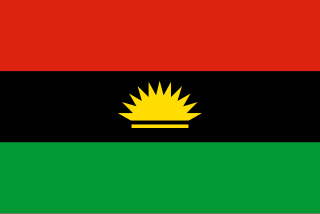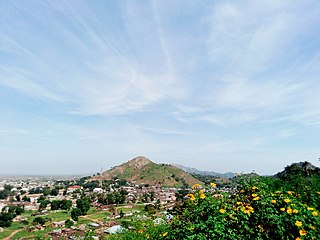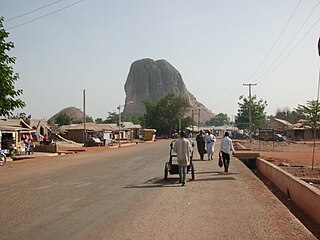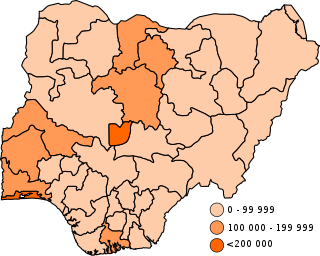
In electronics, a wafer is a thin slice of semiconductor, such as a crystalline silicon, used for the fabrication of integrated circuits and, in photovoltaics, to manufacture solar cells.

Biafra, officially the Republic of Biafra, was a partially recognised state in West Africa that declared independence from Nigeria and existed from 1967 until 1970. Its territory consisted of the former Eastern Region of Nigeria, predominantly inhabited by the Igbo ethnic group. Biafra was established on 30 May 1967 by Igbo military officer and Eastern Region governor C. Odumegwu Ojukwu under his presidency, following a series of ethnic tensions and military coups after Nigerian independence in 1960 that culminated in the 1966 anti-Igbo pogrom. The Nigerian military proceeded in an attempt to reclaim the territory of Biafra, resulting in the start of the Nigerian Civil War. Biafra was formally recognised by Gabon, Haiti, Ivory Coast, Tanzania, and Zambia while receiving de facto recognition and covert military support from France, Portugal, Israel, South Africa and Rhodesia. After nearly three years of war, during which around two million Biafran civilians died, President Ojukwu fled into exile in Ivory Coast as the Nigerian military approached the capital of Biafra. Philip Effiong became the second president of Biafra, and he oversaw the surrender of Biafran forces to Nigeria.

Ijebu-Ode is a town in Ogun State, South Western geopolitical zone in Nigeria, close to the A121 highway. The city is located 110 km by road Northeast of Lagos; it is within 100 km (62 mi) of the Atlantic Ocean in the eastern part of Ogun State and possesses a warm tropical climate.

The Tapti River is a river in central India located to the south of the Narmada river that flows westwards before draining into the Arabian Sea. The river has a length of around 724 km (450 mi) and flows through the states of Maharashtra, Gujarat and Madhya Pradesh. It flows through the city of Surat, in Gujarat, and is crossed by the Magdalla, ONGC Bridge.

Plateau State is the twelfth largest Nigerian state. It is located near the centre of Nigeria and includes a range of hills surrounding the Jos Plateau, its capital, and the entire plateau itself. Plateau State is described as "The Home of Peace and Tourism". With natural formations of rocks, hills and waterfalls, it derives its name from the Jos Plateau and has a population of around 4.7 million people.

Rivers State, also known as Rivers, is a state in the Niger Delta region of southern Nigeria. Formed in 1967, when it was split from the former Eastern Region, Rivers State borders include Imo and Anambra to the north, Abia and Akwa Ibom to the east, and Bayelsa and Delta to the west.The State capital, Port Harcourt, is a metropolis that is considered to be the commercial center of the Nigerian oil industry.
Muri is a town and traditional emirate in Jalingo but covers Karim Lamido LGA ARDO KOLA Yoro, Taraba LGA and others, in northwestern Taraba State, eastern Nigeria, approximately between 9° and 11° 40′ E. and 7° 10′ and 9° 40′ N. The Benue River is nearby, and the portion on the southern bank of the river is watered by streams flowing from the Cameroon region to the Benue. In 1991, the town was estimated to have a population of 56,570. The valley of the Benue has a climate generally unhealthy to Europeans but there are places in the northern part of the province, such as the Fula settlement of Wase on a southern spur of the Murchison hills, where the higher altitude gives an excellent climate.
Tarok is an agrarian society in the hills and on the plains southeast of Plateau State, Middle Belt, Nigeria.

Jukun are an ethno-linguistic group or ethnic nation in West Africa. The Jukun are traditionally located in Taraba, Benue, Nasarawa, Plateau, Adamawa, Bauchi and Gombe States in Nigeria and parts of northwestern Cameroon. They are descendants of the people of Kwararafa. Most of the tribes in the north central of Nigeria trace their origin to the Jukun people and are related in one way or the other to the Jukuns. Until the coming of both Christianity and Islam, the Jukun people were followers of their own traditional religions. Most of the tribes, Alago, Agatu, Rendere, Goemai in Shendam, and others left Kwararafa when it disintegrated as a result of a power tussle. The Jukuns are divided into two major groups; the Jukun Wanu and Jukun Wapa. The Jukun Wanu are fishermen residing along the banks of the river Benue and Niger where they run through Taraba State, Benue State and Nasarawa State. The Wukari Federation, headed by the Aku Uka of Wukari, is now the main centre of the Jukun people.

Wase is a town and Local Government Area (LGA) of Plateau State, Nigeria, situated some 216 km south east of Jos, the Plateau State capital. It shares its name with the nearby Wase River. The population of the LGA was 159,861 people as of 2006, with an urban area of 1750 km².
Ahoada is a city in Orashi Region of Rivers State, Nigeria, located northwest of Port Harcourt. In Ahoada, the Ekpeye language is majorly spoken, though there are other languages in Ahoada like: Engenni, Ogba, Ukwu Ani and Ikwerre.

Bonny River is a river in Rivers State, Nigeria. Water taxis that move along the river provide the connection between Bonny Island and Port Harcourt, the capital of Rivers State, which lies alongside the river. It is also an arm of the Niger River delta. Shellfish such as prawns, periwinkle and crabs found in Bonny rivers have been discovered to contain high metals. The major activities done in Bonny River is fishing and transportation of people and goods.

Ghardimaou is a town in the north-west of Tunisia about 192 km from Tunis. It belongs to the Jendouba Governorate. The town has about 19,574 inhabitants. The rail line from Tunis passing along the Medjerda river ends at Ghardimou; it was built in 1878, and formerly crossed westwards the border into Algeria. Souk Ahras, the first stop in Algeria, is 16 km away.

Obio-Akpor is a Local Government Area in the metropolis of Port Harcourt in Rivers State, Nigeria. It is one of the major centres of economic activities in Nigeria, and one of the major cities of the Niger Delta region, with industries and companies like Pabod Breweries, Coca-Cola Company, Indomie Company and Port Harcourt Electricity Distribution Company.

Ahmed Idris is a Nigerian politician who served as deputy speaker of the House of Representatives of Nigeria from 2019 to 2023. He is a member of All Progressives Congress.

Ikom is a Local Government Area of Cross River State in South-South, Nigeria. Its headquarters are in the town of Ikom in the east of the area on the Cross River and the A4 highway at 5°57′40″N8°42′39″E.
Colonel Muhammadu Abdullahi Wase was a Nigerian military administrator. He was appointed by General Sani Abacha in December 1993 administering Kano State in Northern Nigeria from December 1993 to June 1996.

Wase Rock is a massive dome shaped rocky inselberg found near Wase town in Wase Local Government Area of Plateau State in central Nigeria. Standing alone in the Wase plain, it achieves a remarkable height of about 298 metres (978 ft) above the surface of the neighbouring surroundings and 543 metres (1,781 ft) above sea level.

COVID-19 vaccination in Nigeria is an ongoing immunization campaign against severe acute respiratory syndrome coronavirus 2 (SARS-CoV-2), the virus that causes coronavirus disease 2019 (COVID-19), in response to the ongoing pandemic in the country. Vaccination began on 5 March 2021. As of 28 February 2022, 17,914,944 people have received their first dose a COVID-19 vaccine, and 8,197,832 have received their second dose.














